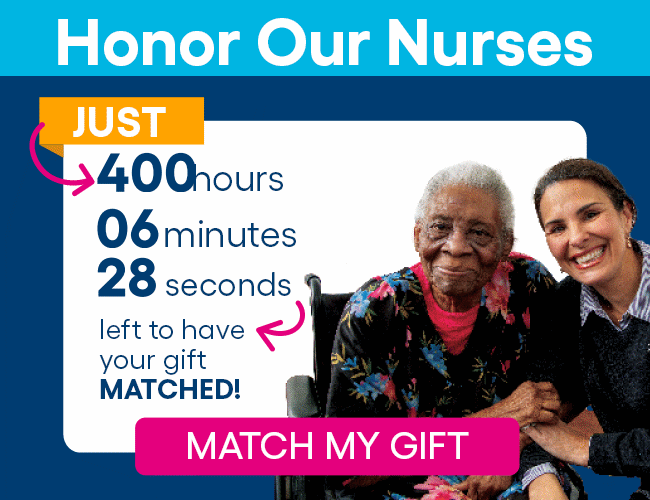The goal of the HOPE (Hospice Outreach Patient and Provider Education) Program is to improve access to hospice care among residents of Harlem and the Bronx by providing resources, knowledge, and hope.
The VNS Health Mission
Hope is about more than just wanting something — it’s about taking real steps to promote positive change.
At VNS Health, equal access to health care is central to our mission. We are not only hopeful but also committed to ensuring that we support our communities by providing compassionate care for everyone who needs it. That’s why, in 2015, we founded the HOPE Program.
A Brief History of Hope at VNS Health
Our commitment to equal access to health care dates back to our founder, Lillian Wald. In 1906, Lillian worked with Jessie Sleet Scales, who was one of the first Black public health nurses, and other Black nursing pioneers to establish the Stillman House in the San Juan Hill neighborhood of Manhattan (today’s Lincoln Center area). At the time, this was the center of New York’s Black community.
Stillman House, which is a branch of VNS Health’s former sister agency, Henry Street Settlement, was one of the first public health clinics that specifically served the Black community.
Today, VNS Health continues to make improving access to health care for all New Yorkers a central part of what we do. This includes compassionate and culturally sensitive care at the end of life through the HOPE Program.
What Is the HOPE Program?
The HOPE Program is centered on helping residents of Harlem and the Bronx become aware of and have access to hospice care.
Evidence shows that Black and Latino people don’t use hospice care as much as white people do. They miss out on the benefits that hospice care brings to people at the end of life and their families.
According to the National Hospice & Palliative Care Organization, in 2018, only 8% of hospice patients were Black and 7% were Latino.
Through the HOPE Program, VNS Health works with neighborhood hospitals and health care providers, faith leaders, and community-based partners:
- Health care leaders talk to patients and community members about hospice care when their illness reaches the terminal stage.
- Local faith leaders help people understand hospice and how it fits in with their faith and beliefs.
- Community groups help people plan for their future, talk to their families, and learn that hospice can actually give them more time with the people they love.
The HOPE Program in the Community
Community outreach and involvement are central to the HOPE Program. HOPE Program team members go to community events and reach out to community leaders to raise awareness about hospice care. Team members also lead educational events on hospice and other health issues important to the community.
Finally, the program educates health care providers. When caring for diverse patients, it’s vital that health care leaders have knowledge about — and sensitivity to — different cultures and how to serve patients in the languages they speak.
How the HOPE Program Supports You and Your Family
It’s a good idea to plan for end-of-life care before you or your loved one needs it. This planning can involve many people — you, your family, extended families, faith communities, and other important people.
The first step is to understand what hospice care is and how it can support you and your loved ones. Hospice care includes everything from medical care to emotional support to spiritual care.
Start by talking to your health care provider, who can provide you with helpful information as you make choices about your care.
You should also have conversations about advance care planning, which involves preparing a set of legal documents that clearly explain your decisions about end-of-life care. Examples of issue to discuss include the use of breathing machines and organ donation. It’s helpful to think about what you want at the end of life and to let the people in your life, such as family, health care providers, and faith leaders, know about your choices.
Hospice teams understand how important faith is to many people. In fact, hospice can be a way to find spiritual peace as well as honor your or your loved one’s life. Spiritual care counselors work with your faith leader and community to keep you connected with worship and fellowship.
Hospice care is provided by a team of caring professionals who are specialists in hospice care — but they recognize that you are the expert on you and your family. Your hospice team is not there to tell you what to do. They are there to support you and make sure you and your loved ones have what you need.
